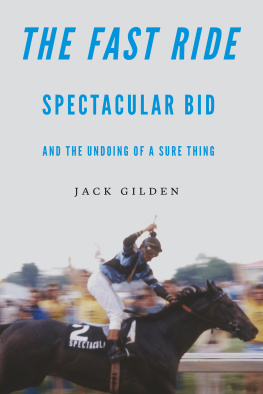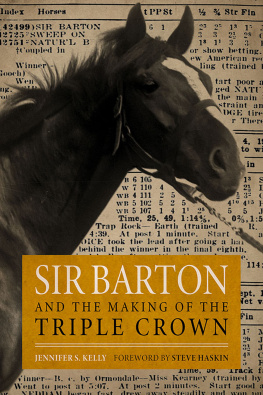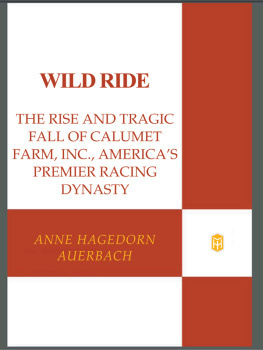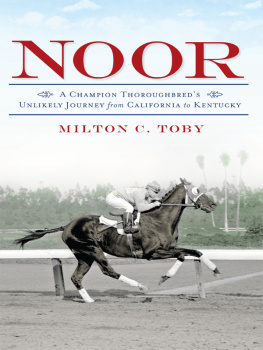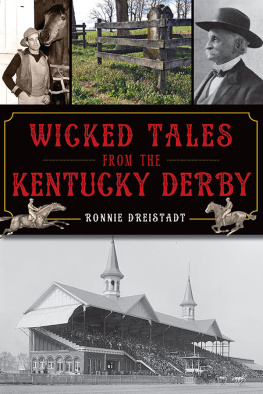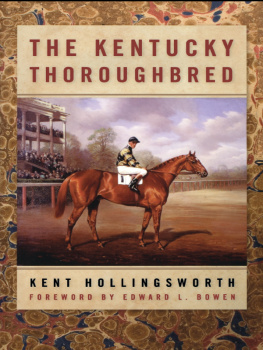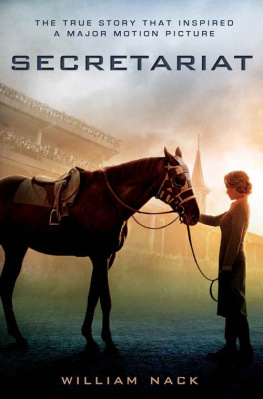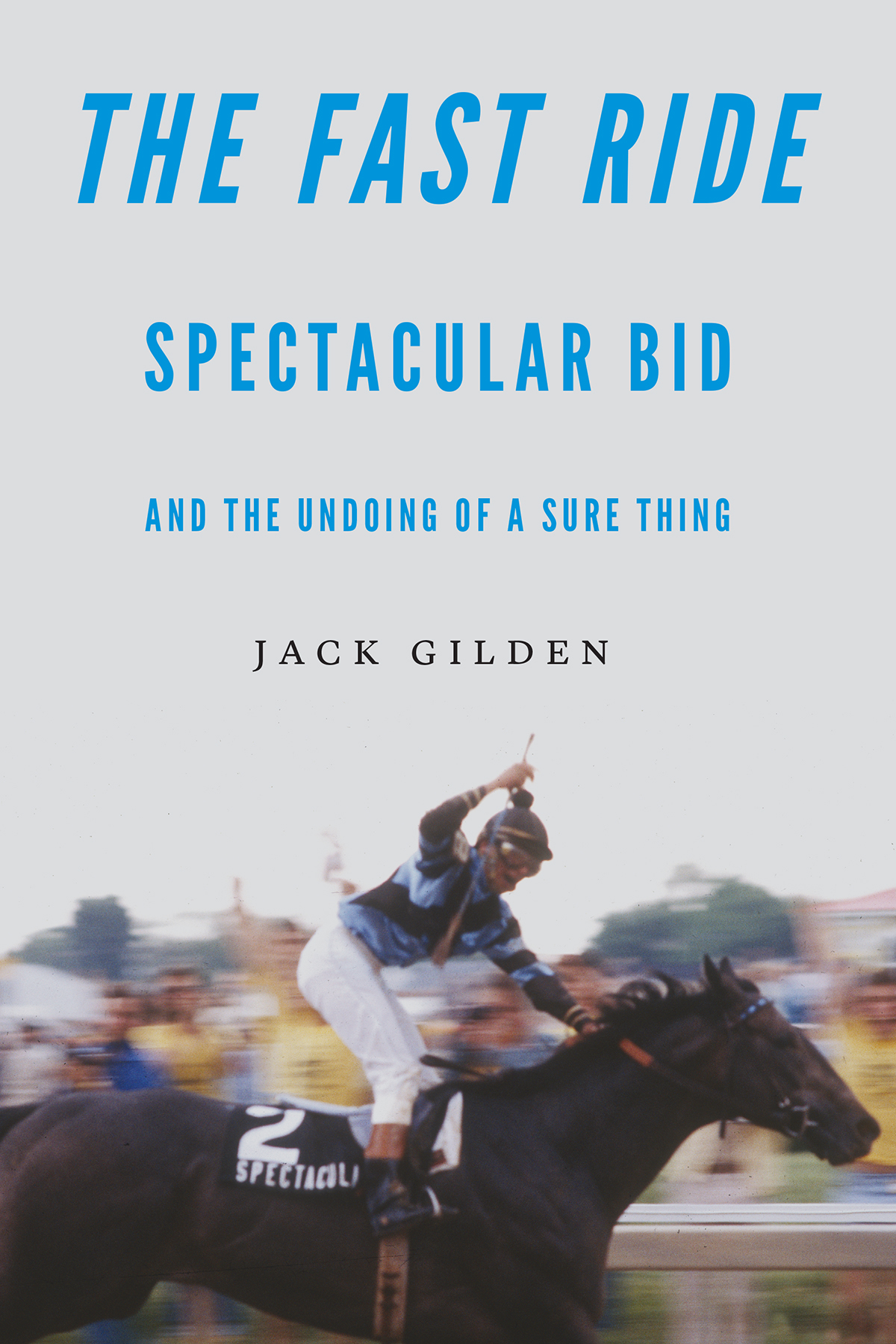
Jack Gildens superb reporting turns the story of a great American racehorse into a riveting lesson about the difference between perception and reality. Spectacular Bid and his wild cast of human connections positively pulsate with energy.
John Eisenberg, author of The League: How Five Rivals Created the NFL and Launched a Sports Empire
Both haunting and harrowingJacks detailed account of Spectacular Bids unique history also serves as a fascinating snapshot of American society and its complicated obsession with the sport of kings.
Amy Lawrence, CBS Sports Radio host
Jack Gilden has written a fascinating, never-before-told, and occasionally lurid tale on the great racehorse Spectacular Bid. Meticulously reported and beautifully written, its as behind-the-scenes, the-barns-and-the-jockeys-room as any racing fan could ever hope for, definitely a must-read for anyone whos ever been off to the races, or not.
Leonard Shapiro, retired longtime reporter, columnist, and sports editor at the Washington Post
The Fast Ride
Spectacular Bid and the Undoing of a Sure Thing
Jack Gilden
University of Nebraska Press | Lincoln
2022 by Jack Gilden
Cover designed by University of Nebraska Press; cover image photo horsephotos.com.
Author photo Steve Belkowitz.
All rights reserved
The University of Nebraska Press is part of a land-grant institution with campuses and programs on the past, present, and future homelands of the Pawnee, Ponca, Otoe-Missouria, Omaha, Dakota, Lakota, Kaw, Cheyenne, and Arapaho Peoples, as well as those of the relocated Ho-Chunk, Sac and Fox, and Iowa Peoples.
Library of Congress Cataloging-in-Publication Data
Names: Gilden, Jack, author.
Title: The fast ride: Spectacular Bid and the undoing of a sure thing / Jack Gilden.
Description: Lincoln: University of Nebraska Press, [2022] | Includes bibliographical references and index.
Identifiers: LCCN 2021036609
ISBN 9781496230508 (hardback)
ISBN 9781496231819 (epub)
ISBN 9781496231826 (pdf)
Subjects: LCSH : Spectacular Bid (Race horse) | Thoroughbred horseUnited StatesBiography. | Race horses. | Horse racing. | BISAC : SPORTS & RECREATION / Animal Sports / Horse Racing | HISTORY / United States / 20th Century
Classification: LCC SF 355. S 644 G 55 2022 | DDC 798.40092/9dc23/eng/20211004
LC record available at https://lccn.loc.gov/2021036609
The publisher does not have any control over and does not assume any responsibility for author or third-party websites or their content.
For the family who have made me so happy: my son, Max, because I am proud of him, and my courageous and talented daughter, Iliana. And also for Angel and Penny.
My doom has come upon me; let me not then die ingloriously and without a struggle, but let me first do some great thing that shall be told among men hereafter.
Homer
Contents
The reader may notice that I have chosen to include the full spelling of racial epithets in the story, particularly those aimed at Hispanic people. That was not a gratuitous decision, nor one I took lightly. Those references remain because I felt that they were critical to understanding the uglier aspects of the story and certain key characters that sent the central action careening out of control. For me, those epithets also point to the larger truth of what a serious and long-standing problem anti-Hispanic racism is in the United States. It cannot be, nor should be, covered up, sugar-coated, or censored.
A great deal of light was shining, but it was neither the warm glow of adulation nor the harsh glare of the spotlight. It was the unforgiving noon sun crashing down on a small patch of dirt in East Baltimore and on the weary, unhelmeted head of Ronnie Franklin. Many years earlier Franklin had been an American sensation, emerging from utter anonymity to the front pages of newspapers and magazines all over the United States. After only two years or so of experience around the racetrack, he was already the dominant rider on a horse that won twelve straight stakes victories, set speed records, and won the Kentucky Derby and the Preakness.
But that was all long behind Franklin. Twenty-five years later, while yet another rider and horse were preparing for the Belmont Stakes and a run at the Triple Crown later that week, Ronnie was doing the grunt work, lugging heavy supplies and tools to a worksite where he was breaking up concrete, mixing mortar, and laying bricks and blocks on the site of an old gasoline station. His employer was improving the now empty lot by building a few new row houses in a city that already had thousands of them that were crumbling to the ground.
Franklins unprotected bald head glistened under the assault from the sunbeams, and his eyes, without glasses, squinted in the glare, proof of his burdensome life. He was indistinguishable from any other laborer in America that day except for one thing. A newspaper reporter was there to ask him questions and write a story about how he had squandered his money and opportunities.
The reporter asked Ronnie a series of hard questions. He wanted to know about the former jockeys embarrassing loss in the Belmont Stakes, and he asked him about the cocaine addiction that ruined the riders once-promising career. After that, the scribe also hunted down Buddy Delp, Franklins so-called mentor and father figure, who had brought the boy into the racing world when he was but fifteen years old. Buddy had given Franklin a job at his barn, a bed at his house, and a seat on the best goddamned horse in the world.
Franklin earnestly blamed himself for losing the Belmont Stakes. He said he got too antsy lagging behind and chased an 851 shot, exhausting his horse.
I probably rushed him, Ronnie confessed.
Franklin also led the reporter to believe that the trauma and shame of that bad ride in the biggest race of his life was the reason for his addictions. [The Belmont] was a big downfall in my life, he said ruefully. I held on to it.
Buddy Delp corroborated for the reporter that all the blame was Franklins: Ronnie rode that day like he was in a hurry to get the race over with, Buddy said for the record, never shy and ever the boss.
But about Ronnies out-of-control drug use, Delp spoke in the nomenclature of a disappointed dad. He told the writer that he had cautioned the boy: Ronnie, Buddy had said, you better settle down because sooner or later therell be some rainy days.
Finally, Delp mournfully explained how he had in the end fired Franklin for blowing a $2,300 paycheck on drugs.
It all added up to a great yarn; the only problem was that none of it was true.
I came into the story as Franklin lay in an East Baltimore hospice gasping his last breaths. I was aided and abetted by one of his friends who had decided it was time that the truth came out.
Right away I could see that Spectacular Bids story was actually two stories. There was the one that everyone knew. That one was about the miraculous horse who lost the biggest race of his career due to the ineptitude of his young, out-of-control rider. That narrative was formed during the Bids career, and it was so powerful and pervasive that even many people in the horses inner circle believed it, convinced either by lies or self-deceptions.
In just a few cursory interviews, however, I could see just how wrong it all was. Talking to people in a position to know, people who were closest to both Franklin and Buddy Delp, I could see a far different and more sinister story beginning to appear. The key to understanding Spectacular Bids greatness and failure was all in the hidden relationship between Buddy Delp and Ronnie Franklin. If the bonds between those two men could be unlocked, the real story would emerge.
Next page
